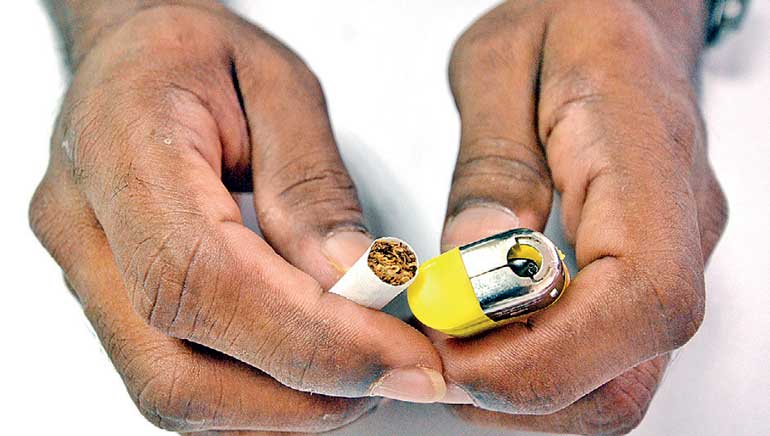Saturday Feb 21, 2026
Saturday Feb 21, 2026
Tuesday, 2 November 2021 01:44 - - {{hitsCtrl.values.hits}}

Legal cigarette sales at outlets have slumped well over 45% since excise-driven price hikes, and any further excessive changes will erode earnings to the State, plus impact the livelihoods of over 33,000 traders engaged in cigarette sales
By Gamini Bandaranaike
A lot of press and publicity has been received by a so-called proposal to raise cigarette prices by Rs. 20 a stick, with various vested groups including politicians making representations on different media. They claim such a move would reduce smoking but still reel adequate revenue to the Government, so it could offer relief for the purchase of essential items. Such statements issued from atop ivory towers ring far from truths and practice of the common man on the ground and are destined for failure.
Over 35 years of experience leading a family-owned retail outlet in Colombo and Kandy Districts, has provided significant insights into the lives and purchasing habits of Sri Lankan consumers from all walks. Accordingly, when considering purchasing power and spend by smokers over the past three years, if the Government or any other group believes it can enhance earnings to the State via a Rs. 20 increase they simply need to consult their own tax revenue data to understand how removed this is from the truth.
Legal cigarette sales at outlets have slumped well over 45% since excise-driven price hikes, and any further excessive changes will erode earnings to the State, plus impact the livelihoods of over 33,000 traders engaged in cigarette sales.
The idea that increasing the price of cigarettes will reduce smoking is a myth created by anti-tobacco lobby groups who refuse to see the big picture. What such a move will do however, is to push smokers to consume more smuggled products which are freely available in the market. Needless to say, this will not only impact the Government’s revenue from tobacco sector but also hit traders in a big way.
A consumer is likely to visit an outlet three to four times a day on average to purchase cigarettes and will also purchase other items such as food and beverages during such visits, which add to the revenue earned by traders. Following the excessive price increase in the past, traders who sell legal products have experienced a significant drop in footfall to outlets, while peddlers of smuggled cigarettes have benefitted. It is safe to estimate that the dip in footfall has led to an overall 6.5% drop in revenue at outlets on top of prevalent economic pressures. People’s purchasing power has diminished significantly in recent times, and government revenue from cigarettes hasn’t grown to match these excise-led hikes in price. Some sections are struggling to make ends meet and this is evidenced by the loss in sales at outlets. It doesn’t then make sense to heap further burden on the public and law-abiding traders in a manner that that will also adversely impact Government revenue.
If anti-smoking lobby groups believe their efforts to reduce smoking was a success, this is nothing but a pipe dream. Foreign cigarette brands, smuggled into the country, are abundant at many outlets in all regions. Every week presents numerous enquiries for cheaper alternatives to the legal product.
Some outlets have reportedly shelved selling locally manufactured cigarettes due to the lack of demand following price pressures and have switched wholly to selling cheap illegal smuggled cigarettes. Priced between Rs. 10 to 50, these smuggled products offer a significant price advantage to consumers and a considerable margin to retailers who choose to sell such products. The loss to the Government will no doubt run to billions every year. Any further excessive increases in prices will only result in driving consumers further towards these unsanctioned products fuelling a black market the government is already struggling to control. This will drive consumers and retailers underground, and further impact law-abiding traders who contribute to tax and the formal economy of this nation. Is this what we want for our nation?
Furthermore, there are significant pitfalls for traders and their families if the legitimate cigarette trade in the country were to breakdown. With over 33,000 traders and 20,000 tobacco farmers in the country, the Tobacco Company supports over 285,000 livelihoods all across Sri Lanka, adding over Rs. 1.65 billion to the agriculture sector alone, as per a report published by Oxford Economics.
Further, contribution to the GDP in 2019 was estimated to be around Rs. 33 billion. Most importantly it is the single highest tax revenue generator for the State. How can the legal cigarette industry continue adding value to the national economy when it must contend with waning sales due to excess tax, hampered further by a growing unfettered illicit market?
Tax considerations must consider the broader picture, be it for the cigarette trade or any other. Governments have seldom considered the intricate value chains that are entwined with products and services behind the marketing and noise that dominate the mainstream space. The lives and livelihoods of thousands of Sri Lankans hangs in the balance of having balanced policy to make ends meet.
The excessive price increase of Rs. 20, proposed so vehemently by the anti-tobacco lobby will spell doom for the domestic legal cigarette industry and threaten the livelihoods of thousands of Sri Lankans who depend on the trade to sustain their livelihoods whilst allowing the rampant smuggled cigarette industry to thrive. Such a move when the local economy is already facing the brunt of the COVID pandemic seems foolhardy.
It is hoped the Government will adopt a measured and practical approach to ensure the sustainability of its dependents, which in turn will benefit the State.
(The writer runs a family-owned retail chain in Colombo and Katugastota.)